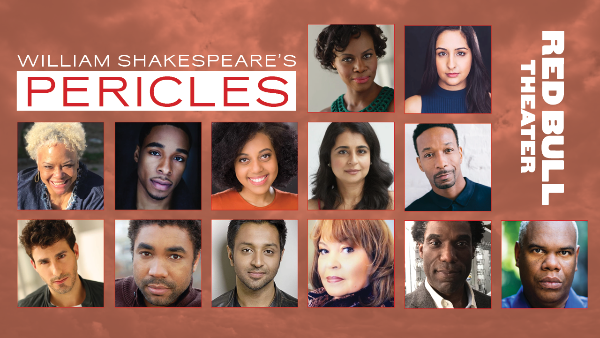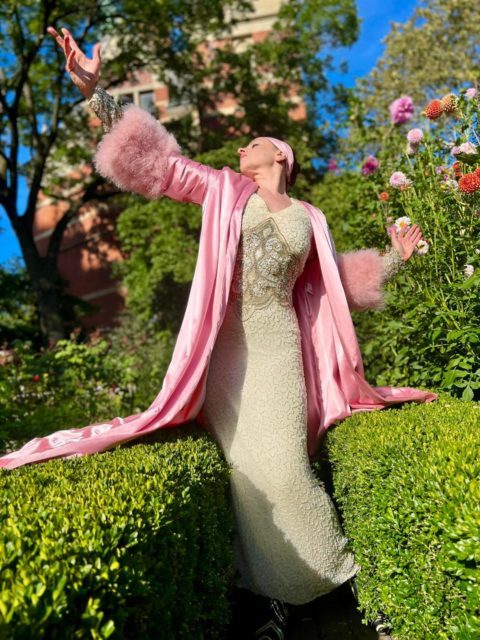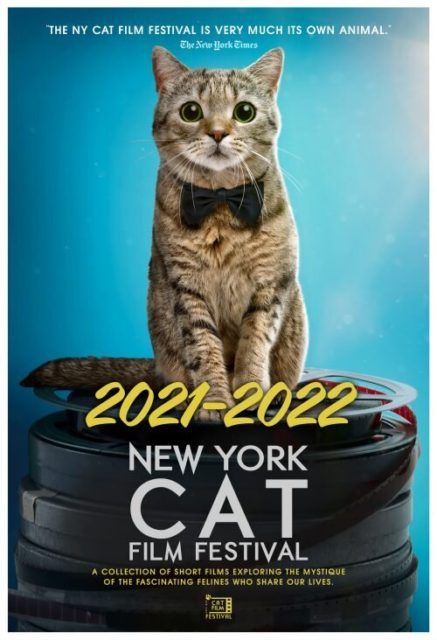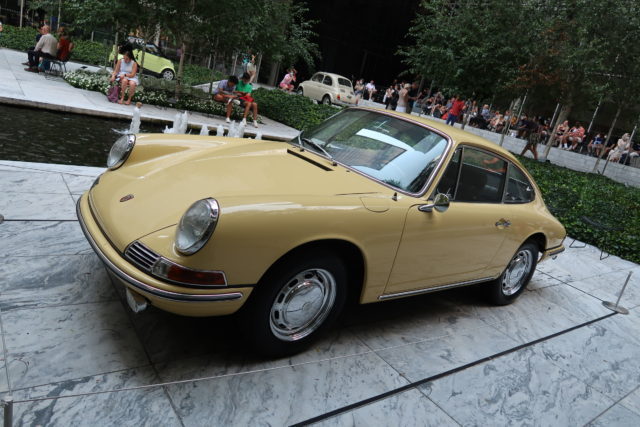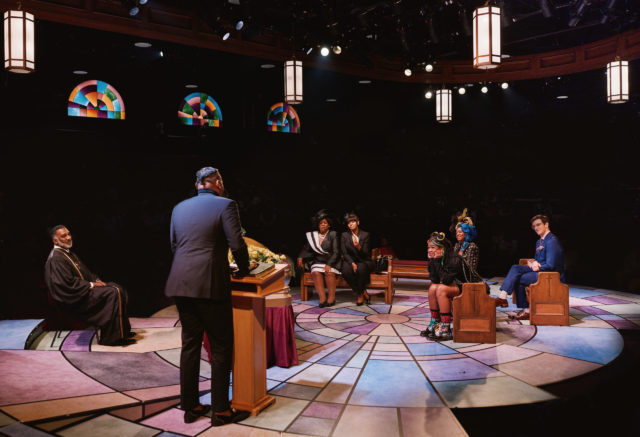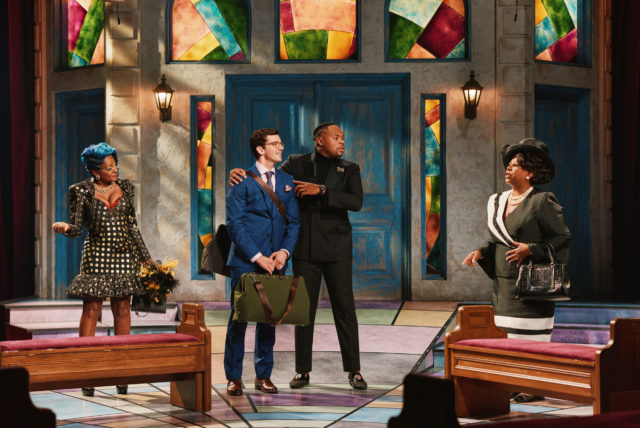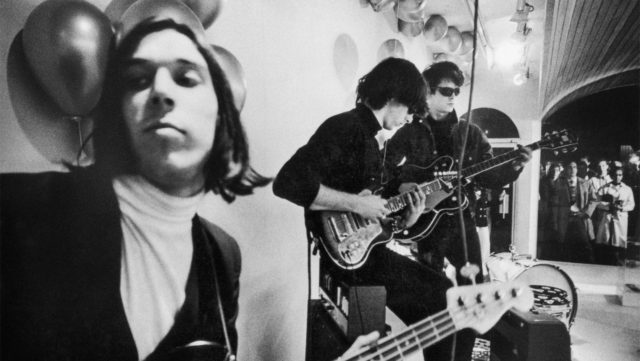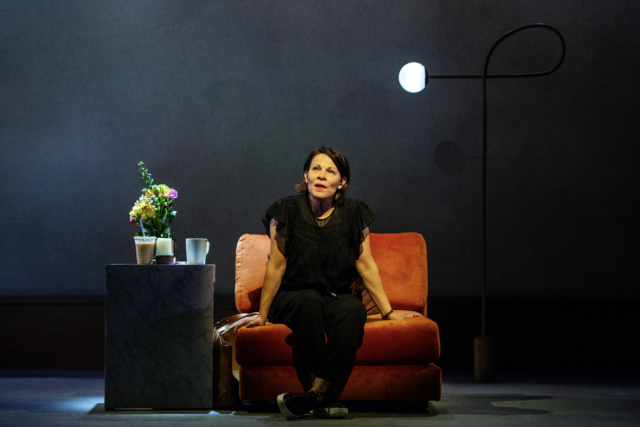
Wallace Shawn’s The Fever continues at the Minetta Lane through October 24 (photo © Daniel Rader 2021)
THE FEVER
Minetta Lane Theatre
18 Minetta Lane between Sixth Ave. and MacDougal St.
Tuesday – Sunday through October 24, $56
www.audible.com
About two-thirds of the way through The Fever, Wallace Shawn’s one-person play being revived at the Minetta Lane, two audience members siting at the front right got up to walk out. Star Lili Taylor paused her monologue but stayed in character as she told the audience she would wait for the two women to leave. They exited slowly, apparently unaware the show had stopped, hoping to sneak out unnoticed. Wryly smiling, Taylor announced that this would be a good time for anyone else thinking of leaving to head for the exits. Wisely, no one took her up on her offer.
The Fever premiered at the Public in 1991, winning an Obie for Best New American Play. The New Group brought it back in 2007 at Theatre Row; Shawn played the unnamed lead both times. Vanessa Redgrave starred in Carlo Gabriel Nero’s 2004 film version. Now the New Group, in conjunction with Audible, is presenting a limited run, with the innately appealing and engaging Taylor as the traveler, a woman sharing tales of vacationing in banana republics. Although you can imagine how Shawn would have delivered the lines, in a much more wild and snarky way, Taylor is exquisite, like a dear friend sitting down with you and talking over tea and finger sandwiches. The writing and performance are so vivid, you’ll feel like you’re on these trips with her, seeing and experiencing exactly what she is seeing and experiencing.
The show is again directed by New Group founding artistic director Scott Elliott, with a light, amiable hand. A masked Taylor arrives in the theater huffing and puffing, running down the aisle and wriggling onto Arnulfo Maldonado’s set. She puts down flowers and coffee, just as so many of us do regularly when we come home, and begins to wheel out furniture on the otherwise barren stage — a lamp, a comfy chair, an end table with two doors. (The cozy lighting is by Cha See.)
“Okay, so it’s great to see all of you. I mostly see your eyes, obviously, but that’s a very beautiful part of any human being — or animal,” she says, welcoming us into her world. “I don’t know how many of you have dogs, but I love the eyes of dogs in particular. Anyway, as you can see, I’m sort of setting up a very small room here. It’s really just suggestive of a room; I’m not trying to convince you that it’s a real room, but it’s useful to represent a room just to help tell the story I’m going to tell you, and also, I don’t know, I think a completely bare stage can sometimes create a sort of almost threatening atmosphere, as if someone were saying, you know, ‘Don’t get too comfortable, there won’t be anything charming or attractive in the course of our evening at all,’ whereas I find these little bits of furniture quite pleasant and nice.’”
She immediately takes us into her confidence, and we’re on her side, identifying with her thoughts about travel, politics, and art. She seems to care about people in need, and we at first forgive her for certain views that sneak into her story. She notes that she goes to “poor countries” where they don’t speak her language, words that begin to make us uncomfortable as they’re repeated, almost like a mantra. Soon she is emphasizing dichotomies of income inequality: She looks at the helpless people across the street in a shelter as she eats in a fancy restaurant. Recalling how an office worker detailed cases of political murder, torture, and rape sponsored by the government, she remembers her parents teaching her how to properly go to the bathroom, wash her hands, and brush her teeth. She describes a wealthy old man spending a ton of money to keep himself alive as he’s dying, paying for all kinds of special treatments, a direct comparison to an execution by injection she recounted earlier. She prances about on a nude beach while so many in the world can’t afford proper clothing and shelter.
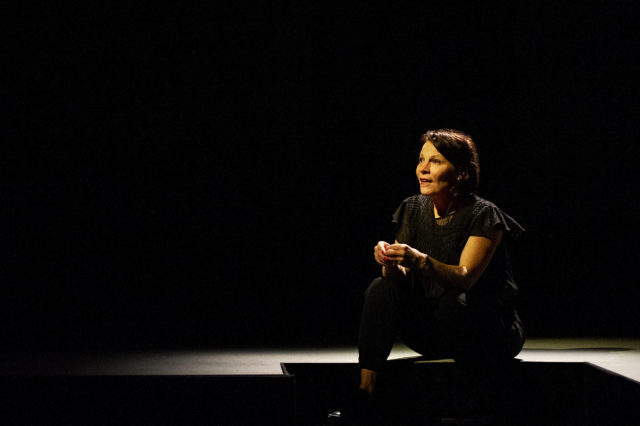
Lili Taylor stars as a well-off traveler sharing vacation stories in The Fever (photo © Daniel Rader 2021)
She admits that she has lived in towns “whose streets ran with the blood of good-hearted victims,” but she still loves the violin and Beethoven. “I like to go out at night in a cosmopolitan city and sit in a dark auditorium watching dancers fly into each other’s arms,” she says, turning a mirror on just about everyone in the theater. She sees The Cherry Orchard with friends but doesn’t understand why she was supposed to be weeping by the end.
Where we were previously nodding in agreement with the traveler, we become taken aback as she starts criticizing poor people for depriving her of the fun she used to have. “I’d always said, ‘I’m a happy person. I love life,’ but now there was a sort of awful indifference or blankness that was coming from somewhere inside me and filling me up, bit by bit,” she complains. “Things that would once have pleased me or even delighted me seemed to go dead on me, to spoil. But my problem was that somehow, suddenly, I was not myself. I was disconcerted.” She turns so sad that she can’t even give her family presents anymore, and it isn’t long before she is blaming the poor.
Our comfort level continues to decrease when she proclaims, “Yes, I’m an aesthete. I like beauty. Yes — poor countries are beautiful. Poor people are beautiful. It’s a wonderful feeling to have money in a country where most people are poor, to ride in a taxi through horrible slums.” She rationalizes why she is not going to give all the money in her purse to a beggar, arguing that she worked hard for that money. “I’m entitled to be served, I’m entitled to expect that certain things will be done. Which means that the holders of money determine what happens in the world,” she says.
Ah, there it is; the truth comes out, and it’s not easy for a liberal New York City audience to hear. Years before the subprime mortgage crisis, before President George W. Bush called his base “the haves and the have-mores,” before the immigration crisis reached epic proportions, before corporations as people were awarded First Amendment rights, Shawn spotlighted the privileged, the growing income gap, and the personal justifications necessary to maintain some agreeable level of inequality by people on both sides of the aisle.
Taylor (Six Feet Under, Household Saints), who played Lemon in the New Group’s 2004 revival of Shawn’s 1985 examination of civilization, Aunt Dan and Lemon — and was mesmerizing reprising the role with the rest of the original cast in a streaming Zoom version during the pandemic — is a warm, affectionate actor, and she excels as the traveler, setting us up for a reevaluation of our personal belief systems, of what we deem important and unavoidable on a beautiful planet where ugliness awaits just around the corner. We can’t help but like her, and in liking her — at least in part because we identify so closely with her — we give her character the benefit of the doubt.
As Pogo said in a 1971 Earth Day comic, “We have met the enemy and he is us.” Perhaps that’s why those two women got up and left before the play was over.
